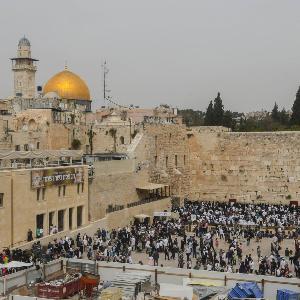Historians’ Conference: Digital debates on “Conflicting Interpretations”
1 Oct 2021
LMU is hosting the 53rd Conference of German Historians as a large-scale digital event, which begins on Monday evening.
1 Oct 2021
LMU is hosting the 53rd Conference of German Historians as a large-scale digital event, which begins on Monday evening.

The partner country Israel finds itself at the center of conflicting interpretations. Holy places in Jerusalem. | © IMAGO / Winfried Rothermel
It’s one of Europe‘s largest conferences in the Humanities – the Conference of German Historians. Originally scheduled for 2020, the 53rd in the series had to be postponed owing to the COVID-19 pandemic. It will now take place from 5-8 October, 2021. – But it opens with an inaugural event on this coming Monday (4 October). The 53rd Conference of German Historians is being held largely in digital form on a dedicated conference platform. However, this does not imply any reduction in the scale of the meeting. Some 600 speakers from Germany and abroad are expected to participate in the sessions. Approximately 100 subject-specific sections are listed in the program, which will be held as video conferences. The contributions cover a wide range of topics and all historical epochs. Over 2000 participants have registered for the event, which was jointly organized by the Association of German Historians (VHD), the German Association of History Teachers (VGD) and LMU.
The motto chosen for the Conference is “Conflicting Interpretations”. The term refers to the sorts of disputes over what societies regard as true, just and legitimate. Disparate perceptions of the nature of change have always accompanied and reflected historical developments, and in turn contributed to their dynamic evolution. According to the organizers, the historical sciences can bring these competing narratives to light and foster a better understanding of the complexity of historical change. “The leitmotif of the last Historians’ Conference, held in Münster three years ago, was “The Divisions in Society”. In a certain sense, the motto “Conflicting Interpretations” takes up the theme in a different key. The term is associated with disputes in which neither side is willing to concede,” says Martin Zimmermann, who holds the Chair of Ancient History at LMU and is the Coordinator of the Conference. “One possible outcome of the upcoming meeting and its efforts to debate contested issues in an agreed historical framework is the recognition that such conflicts can be profitably discussed in more appropriate communicative contexts,” he adds. The Conference’s partner country this year is Israel. Israel’s complex geopolitical position has placed it at the center of conflicting interpretations of historical and political – and indeed existential – issues.
“I’m very pleased that the 53rd Conference of German Historians is taking place here at LMU. With its motto ‘Conflicting Interpretations’ and with Israel as its partner country, it takes up two themes that are undoubtedly of great importance – not only in the social and political spheres, but also in the realm of academic debate,” says Prof. Dr. Bernd Huber, the President of LMU. “I wish the Conference the best of success, and I hope that all of its participants will benefit from interesting and insightful discussions.”
“The Historians’ Conference is one of Europe’s most important congresses in the Humanities, and in choosing the motto ‘Conflicting Interpretations’ this year, it has taken up a fascinating theme that is both topical and socially relevant. Conflicting interpretations have always accompanied historical developments and shaped the course of debates in the historical sciences,” says Science Minister Bernd Sibler. “Indeed, our own society continues to wrestle with such questions. But the past can be a source of insight into our current dilemmas, and can in turn have an impact on our future. In addition, the study of these links is a fundamental element of the historical sciences, which underlines the importance of the discipline for our democratic society. Learning about the past can serve to warn us, while simultaneously giving us confidence. As a history teacher and Minister for Science, I regard that as very important.”
A selection of events on the conference program will be streamed from the Great Aula on the dedicated digital conference platform. For example, on Thursday (7 October 2021, 11.00 am – 1.00 pm), Andreas Eckert (Berlin), Larissa Förster (Berlin), Elisio Macamo (Basel) and Hermann Parzinger (Berlin), together with moderator Roland Wenzlhuemer (Munich), will discuss new perspectives in the ongoing debate over the restitution of cultural treasures. Later that same day (7 October 2021, 4 pm – 6 pm), the Israeli novelist David Grossman will discuss “The Art of Storytelling and Historical Narratives” with Mirjam Zadoff (Munich) and Michael Brenner (Munich).
Information on the Conference Program and details of registration are available at www.historikertag.de.